Roleplaying games are a social activity. The D&D groups that we remember for years to come are those played together with friends whom we love, or come to love over the course of countless sessions. These are the groups whose characters remain with us, who we tell stories about, and who we compare all other RPG characters to in the future.
Games like this sometimes happen by pure chance, but your odds of forming a legendary gaming group with an epic campaign and unforgettable characters skyrocket when you consciously work with your friends between sessions to create strong character relationships. In this installment of New Player’s Guide, learn how to create character bonds in-game, how to extend character bonding outside of RPG sessions, and how to help ease you and your friends into forming deep character relationships without making things awkward.
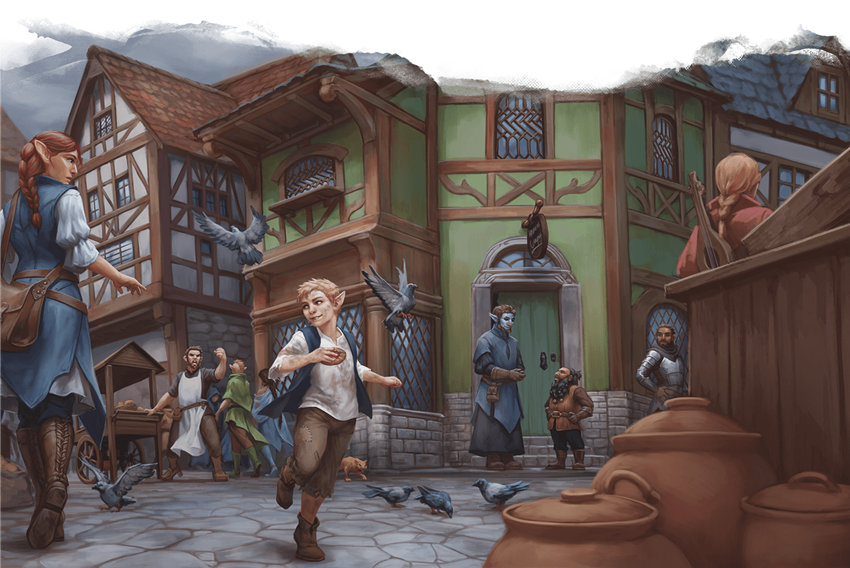
Roleplaying Without Making it Weird
If you’re not used to roleplaying, pretending to be someone else can be terrifying. And awkward. Terrifyingly awkward. Most of us roleplayed as kids in some capacity; you might have play-acted lightsaber duels with sticks or pool noodles, or pretended to Pokémon trainers, or pretended to be exploring dangerous ruins like Indiana Jones. What it was doesn’t matter—think back to the freedom from embarrassment and ego you had back then. You could do anything as a kid, without worrying if it was cringey or awkward. Your friends didn’t think you were weird because you loved doing something out of the ordinary with all of your heart.
Remember that feeling. If you’re your group’s Dungeon Master, you have the power to ask your entire group to do that. The biggest cause of roleplaying awkwardness is an atmosphere of judgment. Your D&D group is much more likely to explore their characters’ personalities if they feel safe that their friends won’t judge them for it. For some people, this is taken as a given. Most of the naturally outgoing or extroverted people I’ve played with aren’t saddled by this fear of social judgment—but the vast majority of the introverts or otherwise socially awkward I know (myself included) have had to work hard to overcome this fear. I’m totally confident doing funny voices when I’m DMing a half dozen different NPCs and monsters, but creating deep emotional bonds with friends while I’m playing an adventurer is still something I need to psyche myself up for.
If you want to create a safe environment for roleplaying that’s free of judgment, say it out loud to your entire group. Do it during a Session Zero, so that you know you have everyone’s full attention. If your DM says, “Don’t giggle or make fun of people for roleplaying. This table is a place where people are free to experiment, be weird, and try things that might not work without judgment,” then they are laying down a house rule that should be adhered to with as much respect as a mechanical house rule. Creating a safe atmosphere is really as simple as saying those two sentences—though the DM and the players need to self-police themselves afterwards to make sure that environment stays welcoming. If people giggle and make fun without consequences, then you’ve shown the wallflowers among you that your promises don’t mean anything. Give them a reason to trust you—just like any relationship, a good roleplaying relationship is all about trust!
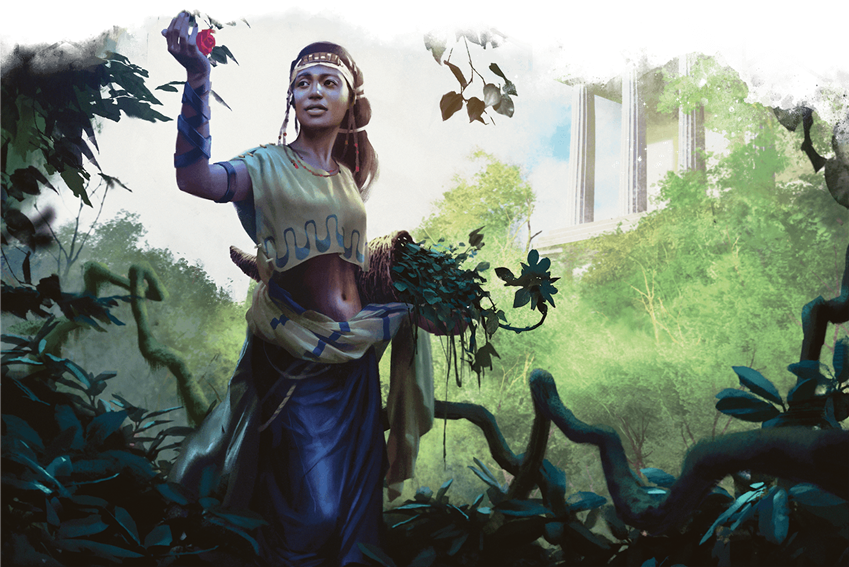
Setting Boundaries
Speaking of trust, the topic of boundaries is important enough to merit its own section. You and your fellow roleplayers aren’t mind readers. When you sit down to play with people you’re playing with for the first time, it’s important to ask them about what topics they are and aren’t interested in bringing up during roleplay, and which topics they absolutely do not want touched upon. Again, this is a great topic to cover during a Session Zero.
Long-time friends may have intuited one another’s boundaries and limits over the course of the years they’ve known each other, so you don’t need to formally ask them anything. If you’ve played D&D with one group of people for months or years, you may have fallen out the practice of asking people what their roleplaying boundaries are, if you were even in the practice at all! That’s totally understandable; you know your friends well enough that you don’t need to anymore. But if you start playing with a new group where you haven’t established that rapport yet, or if you’ve just invited a new person into your group, taking a moment to lay bare all the things you take for granted is incredibly important—and who knows, you may even open the door for one of your long-time players to voice some concerns that they’ve been too worried about rocking the boat to say until now.
Forging Bonds During Gameplay
The seeds of important character relationships are sown in the moment, during gameplay. One character saves another from certain death. Two characters decide to work together to convince a captive pirate to reveal the location of his booty. Several players are all knocked unconscious in a desperate battle against a villain who manages to escape, and so they all swear vengeance together when they are healed and awakened.
Bonds between characters are vital for good roleplaying. They create common ground for the characters to interact with one another on a deep level. Your character sheet has a space for you to write down the bonds that drive your character to adventure, based on your Background. These bonds are great for motivating your character once you start adventuring, but it’s bonds that you develop between other characters that unite you as a party. Why would four highly capable warriors, rogues, and mages travel together? There’s strength in numbers of course, but why doesn’t a character leave the party when they go on an adventure perpendicular to their bond?
Sometimes the answer is just because “we all want to play D&D together,” but a better, more character-motivated answer is “because our characters care about one another.” You’ve formed bonds of friendship, duty, shared vengeance, or even love with the other members of your party.
If you feel like the characters in your party aren’t creating these close connections, the simplest and most straightforward way to start forming these bonds is by asking your fellow players if they’re interested. Ask, “I want my character to have a closer relationship with your character. Remember when they both did _______? My character feels ______ about that. How about yours?” Ideally, they’ll reciprocate, and you can start working together with that player more closely. If they’re not interested in roleplaying in that way, then hopefully they’ll tell you straight-up that they aren’t interested in that kind of RP, and you can try to create a character bond with another player’s character.
There are also game mechanics that support this. The spell warding bond is a great low-level tool that links two allies together, allowing them to share equally in one another’s peril. The spell compelled duel also creates a singular bond between two creatures, though this bond is between an ally and an enemy. If you want to form a rivalry between your character and an NPC villain, this spell is a great way to lay the foundations for that relationship. Just yell, “Stop! They’re mine,” and watch as you and that villain become the center of attention.
Think of other spells or class features you have that will help you create roleplaying bonds. Class features like the Protection fighting style (available to fighters and paladins) give you a great prompt to stop a giant monster from goring your friend, then stare right into that beast’s ugly face and snarl, “Keep your claws off my friend.” Remember that all of these spells and features are just prompts; they’re opportunities for you to then do something cool in-character. The spell or feature alone isn’t enough to create a fun and memorable bond, but it will give you an easy opening to start.
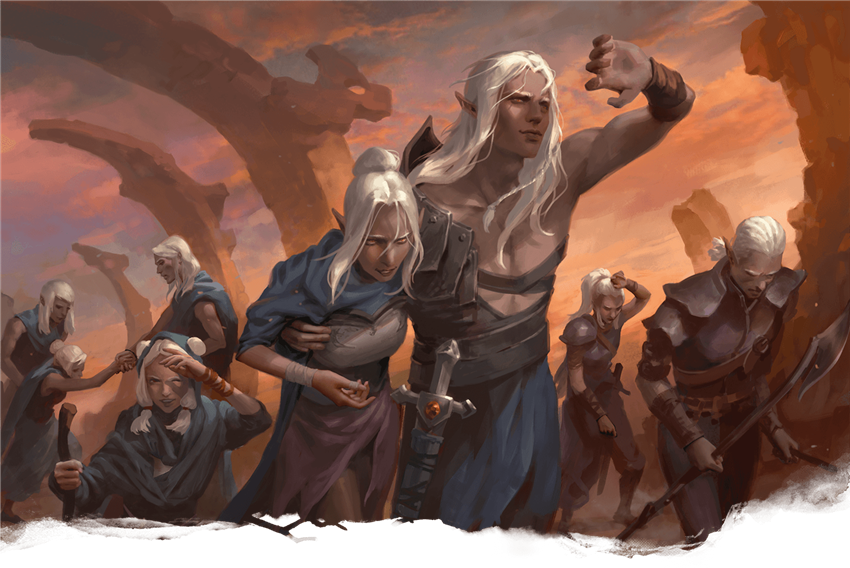
Lifelong Companions
There’s also one more unique game mechanic in particular that deserves its own section: the Lifelong Companions. Mythic Odysseys of Theros introduces a new character-building element that serves to create heightened, mythic stories: Supernatural Gifts. Just like heroes of ancient mythology, characters in Theros campaigns are touched by divinity. One of these gifts transforms your character into one of the Nyxborn, a being born of the minds of the gods; another makes you an oracle, a being who can interpret the inscrutable signs of the gods themselves.
Another allows you to form an unbreakable bond with another character or NPC. This gift, the Lifelong Companion gift, grants you in-game mechanical benefits for being near your companion, and near your other party members as well. However, it also specifically asks you to get the consent of the player who you want to form a bond with before doing so. This is great! Everyone who wants to form character relationships should talk with those characters’ players often about the form their relationships are currently taking, and what ideas they have for their relationships in the future.
The best time for these talks to happen is away from the gaming table.
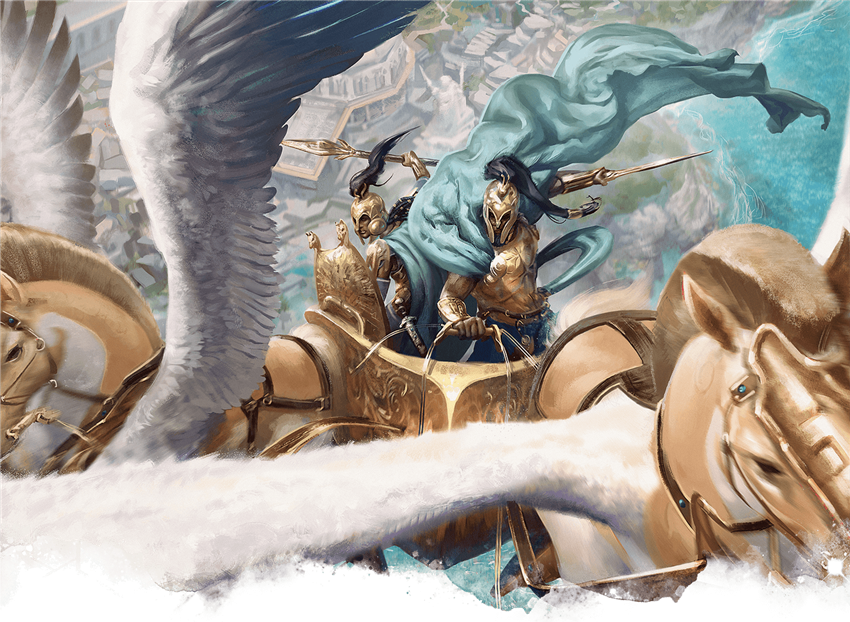
Going Beyond the Gaming Table
It’s the middle of the week. You don’t have another D&D game until Saturday, and isolation during the pandemic is making you twitchy. You want to play D&D because it’s your weekly fix of good, fun social interaction. You don’t have to wait for the next session of the campaign to create a scene of your character and another character talking at camp, or going hunting together, or doing something small between adventures.
It can be easier to roleplay with a full group of people there, since you can step in and out of the spotlight whenever you feel like it. But, if you feel awkward roleplaying in front of a large group, it could be easier to sit down with a friend and roleplay a scene one-on-one over video call. Or, if you’d rather not to do that, open up a shared text document (using Google Drive or a similar app) and roleplay out a scene over text, like you’re playing your own mini play-by-post forum RPG. It’s best to let your DM know that you’re doing this, and to be respectful of the world they’ve created. Don’t go killing dragons in your scene unless you’ve asked your DM’s permission. Hunting a giant elk or protecting yourself from hobgoblin raiders might be more reasonable.
If you’re the DM and you want to delve into another character’s backstory, see if they’re interested in running a one-on-one RP session with you. In my current campaign, there are two ways that I like to RP one-on-one with players. The first is during downtime; my players’ party frequently stops in town between adventures for a week or two at a time, which gives them a chance to train, shop, and relax. I also take that time to ask if they do anything interesting in town during their downtime, and RP out mini-sessions with one or even two or three other players. Try to respect other peoples’ time while doing this; unless everyone wants to go long, keeping these downtime sessions to an hour or less is probably for the best.
The other type of one-on-one RP I’ve enjoyed during this campaign is similar to what I suggested two players do above. I take on the role of an NPC from one of my players’ backstory, and do a back-and-forth text RP to explore the details of that backstory. Typically, the player and I both have an idea of how the scene will end, so we’re both careful not to suddenly swerve off-track unless we have a good idea about how to get back. This is very different from most D&D sessions, where everything is up in the air and we find joy in the unexpected—but the change of pace is fun, and refreshing, and worth trying if you have players or a DM who’s interested in trying.
The most important rule of one-on-one roleplay is respect. Whenever I worry that I’m taking things off the rails, I explain my thinking to my friend in an out-of-character chat. If the player thinks everything’s okay, then we keep playing as normal, but if something seems wrong, neither of us are afraid to rewind and try again. As long as you respect what the other person wants, you can’t go wrong.
How do like to roleplay in your D&D games? Are there other fun ways of building relationships between D&D characters that you like to use in your D&D games? Let us know in the comments!
Create A Brand-New Adventurer Acquire New Powers and Adventures Browse All Your D&D Content
 James Haeck is the lead writer for D&D Beyond, the co-author of Waterdeep: Dragon Heist, Baldur's Gate: Descent into Avernus, and the Critical Role Explorer's Guide to Wildemount, a member of the Guild Adepts, and a freelance writer for Wizards of the Coast, the D&D Adventurers League, and other RPG companies. He lives in Seattle, Washington with his fiancée Hannah and their animal companions Mei and Marzipan. You can find him wasting time on Twitter at @jamesjhaeck.
James Haeck is the lead writer for D&D Beyond, the co-author of Waterdeep: Dragon Heist, Baldur's Gate: Descent into Avernus, and the Critical Role Explorer's Guide to Wildemount, a member of the Guild Adepts, and a freelance writer for Wizards of the Coast, the D&D Adventurers League, and other RPG companies. He lives in Seattle, Washington with his fiancée Hannah and their animal companions Mei and Marzipan. You can find him wasting time on Twitter at @jamesjhaeck.








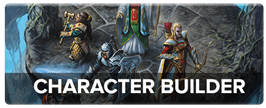
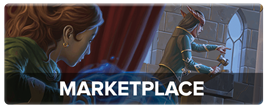
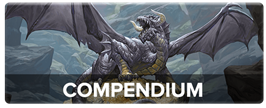
-
View User Profile
-
Send Message
Posted Jun 26, 2020This is an incredible article. RPing is always hard for me and my players, and this definitely helped. Thanks!
EDIT: FIRST!
-
View User Profile
-
Send Message
Posted Jun 26, 2020This is very helpful! Thanks!
-
View User Profile
-
Send Message
Posted Jun 26, 2020This is super cool ... I never thought about 1 on 1 stuff. Sounds super cool and fun! But please James: Bring back class 101! So many people want it, and it would be so nice. Thanks you for these posts.
-
View User Profile
-
Send Message
Posted Jun 26, 2020These kind of "away from the main game" sessions are a staple among my players who prefer to "lone wolf" an aspect of their character. They're a great way for wizards to learn valuable research to help the party or rogues who want to perform a heist that the rest of the party would absolutely muck up for them. I've found that in doing these as you've suggested not only helps deepen the enjoyment for those specific players, but helps to cut down on the boring-for-everyone-not-involved moments. We've only got a few hours a week where we can ALL play together, that time should focus on the whole group and not just one or two characters.
Thanks for the ideas on how to incorporate some of the newly released content, James.
-
View User Profile
-
Send Message
Posted Jun 26, 2020Class 101 will return! I can't promise when it will, but I can promise that it will return with a bang.
-
View User Profile
-
Send Message
Posted Jun 26, 2020Super good advice from James here. Thanks!
-
View User Profile
-
Send Message
Posted Jun 26, 2020Yes! Years (a few weeks, maybe a couple of months) of begging, and oghma has blessed me with the knowledge that Class 101 will return! Where are my Warlock powers at now? Give them to me, great master of words.
-
View User Profile
-
Send Message
Posted Jun 26, 2020How do you add spells to your character sheets? i've tried but gotten nowhere
-
View User Profile
-
Send Message
Posted Jun 26, 2020Only for Spellcasters: next to the class features bit, under the class name, it says spells. Then you can add spells. Cantrips and all that stuff.
-
View User Profile
-
Send Message
Posted Jun 26, 2020Thanks for the advice!
-
View User Profile
-
Send Message
Posted Jun 26, 2020This is great! Here’s another thing, if your using discord and made a personal server for it, you can always make what I call RP zones, Places where you can RP a character between sessions, it’s great for players who don’t feel comfortable Roleplaying during the session!
-
View User Profile
-
Send Message
Posted Jun 26, 2020I think it’s just a typo. Here’s the intended text:
“I also take that time to ask if they do anything in town during their downtime”
-
View User Profile
-
Send Message
Posted Jun 26, 2020Precisely right, good eye. Thank you both!
-
View User Profile
-
Send Message
Posted Jun 26, 2020people at d&d beyond, please make a collection of all the new player's guides.
please do it.
-
View User Profile
-
Send Message
Posted Jun 27, 2020You can click on the "New Player's Guide" tag at the bottom of any article in the series to see a list of all articles. Or, just click on this link to the New Player's Guide tag. =)
-
View User Profile
-
Send Message
Posted Jun 27, 2020This article is amazing! My group is currently prepping for a new campaign and I can't wait to start. Our DM is amazing and I'm so excited to see where the story takes us.
-
View User Profile
-
Send Message
Posted Jun 27, 2020So this day and age playing remotely is the big ticket thing due to the pandemic and quite frankly because technology allows us to play with people from all over the world, and that's amazing! That being said you are still beholden to time slots and people's schedules in order to get your games going.
I know a lot of people (myself included) use a combination of D&D Beyond, Roll20, Beyond20, and Discord to keep their games running smoothly and so that they can get the most out of their games.
One of the things I suggested to my DM and she has carried into each of her other campaigns is making a "Campfire Chat" channel in the groups Discord server.
After a long day of adventuring, you always want the players to take a break, and get some rest, and that way you can have a good solid ending point for your session and then kick right back off next week after a good long rest in game so your character is at it's peak! This is the opportunity for a lot of things to happen which don't always happen due to time constraints.
The campfire chat allows for a few things to occur. In our chat, you talk as your character and emote as necessary if you do something like deal cards, get a drink, etc... and mark your sheet accordingly. Not ground breaking stuff you need the DM for, just an "our characters are hanging out by the fire". This gives those shyer players a chance to really open up with their character. It gives people a chance for their characters to open up to each other sometimes to a degree they couldn't in person due to personal comfort levels. It gives people a good chance to think out their answer, "how would my character answer that." After doing this a few times, players really grow into their characters and feel a lot more confident when they come to the live sessions. Think of it like training wheels for RP.
-
View User Profile
-
Send Message
Posted Jun 27, 2020I got some great ideas from that article. Thank you.
-
View User Profile
-
Send Message
Posted Jun 27, 2020This is magnificent. The #dnd channel of my group's Discord server is constantly flowing with character thoughts. It's a great thing to have!
-
View User Profile
-
Send Message
Posted Jun 27, 2020Love your articles, James! I showed this article to my newbie players. They really appreciated it and said it was very helpful for them getting started with how to roleplay better. Thank you!